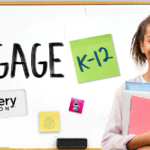by Art Willer
In our enthusiasm for all things Internet, we have overlooked an important minority who cannot navigate online tools, the way the rest of us can. All encouragement goes to the access advocates who are raising their voices.
Before we get comfortable, thinking access is the only fire we have to address, there is more: privacy, security, and quality. I am writing to share actions to take, on all of these burning issues.
Privacy and Security
A teacher called to ask me whether our online program UltraKey Online, would print a list of student names and passwords. I told him certainly not, because that would break a cardinal rule for online security.
An online program should never transmit passwords, except for temporary password reset purposes. If a program can transmit passwords for one user, it can transmit them for any user who might acquire the required login and password. That is by far the most common way data breaches occur.
The teacher argued that all the other apps he was using did this for him, and suggested our company did not understand the problems a teacher faces. After all, we are only talking about children’s online learning records.
Parents have a very different opinion from this teacher. And the Children’s Online Privacy Protection Act (COPPA) does too. It mandates all of us to protect children’s privacy, no questions asked.
As a developer and publisher of online learning applications, half of our development cost is incurred in ensuring security of the application and privacy of its users’ data. Strategies like never transmitting or displaying passwords are simply good practices, so they do not really cost us anything. It’s all the other potential breaches that do. For example, robotic programs called bots, attack our servers about 350 times per hour, looking for weaknesses to exploit. Fortunately, we have the knowledge, and we spend the money and effort to repel those attacks.
Superintendents and principals, please do the following:
Conduct a survey today, to determine every single application that is being used in your classrooms, whether it is free or not.
Immediately stop using any application that prints lists of children’s names and passwords, because that application is in violation of the COPPA. Given the app is breaking such a simple security protocol, it probably has other more egregious security deficiencies. In accordance with COPPA, the application must display a privacy policy for all users including children. It must display personal contact information, so parents know who to ask should they want their children’s information removed or changed. These are just a few criteria, schools and districts must ensure for every online application they use.
Ask about all applications and web sites in use, including common login sites, such as Google.
Halt the use of common logins, until you have conducted a more thorough investigation of whether those logins, and the companies behind them, subscribe to COPPA.
Free applications cannot be used without applying the same COPPA standards. All apps used in school, and those recommended by a school, have to comply with COPPA. Period.
What if you find that 99% of the apps your schools are using, fail to comply with COPPA? Even if halting their use would halt almost all Internet usage, so be it.
Go back to basics, call everybody to order, and move forward from there. Do this to comply with COPPA, and do it for the sake of the children. Their privacy and security, deserves our highest respect.
Access
When we think about accessibility, visually impaired people, and sight-free people usually come to mind. They are not the only people who need to be considered. For example, a person who has an attention deficit disorder or a reading disability, also needs accessibility albeit in a different form.
At my company, we increase accessibility for all users, by adding voice-over instruction. We build in the capability for every button to speak aloud its function. Spoken help is also provided.
We also provide an adjustable interface, and ways to adjust other parameters of learning. Learning style can be viewed as an accessibility factor, so we build in ways to adjust our applications to suit different learning styles.
The more difficult form of accessibility to achieve, is to accommodate sight-free people. I recently discussed the matter with a sight-free woman who had a totally sight-free child. In frustration, she stated, “Every application that is accessible to us, is boring and ineffective. Every application that is exciting, is not accessible.”
The inherent challenge in online app development and access for sight-free people, is that excitement and effectiveness are achieved through visuals with accompanying sound. Meeting the needs of sight-free people (and others who need accessibility) is not just a matter of overhauling our application code. It is a matter of asking how we can be effective, with this deserving audience.
Superintendents and principals, here is what I suggest:
Identify the online apps that are being used in the classroom, which have an accessibility policy, or at least a discussion of accessibility in their teacher guides.
My company does not post an accessibility policy (yet), but we include a substantial section about meeting special needs and being accessible, in our manager guide. Survey whether the apps you are using, even appear to provide access.
Among those apps and companies who have addressed privacy and security, you will likely find they have addressed access, or they are in the process of addressing access.
Contact the application developers to discuss their accessibility strategy. In my company’s case, we are actively looking for school districts to invest and work with us to develop truly effective interfacing for the broader audience.
If you are an accessibility advocate, I also welcome your contact. Collaboration among accessibility advocates, school districts, and publishers will ultimately address the access challenge.
Quality
Imagine. A school committee has spent two months reviewing and evaluating several typing instruction apps. The committee informs me with despair: “We recommended purchasing your program, but the principal found a free app, and told us to use it instead.”
Schools operate under limited budgets. Just as convenience does not excuse lax attitudes toward privacy, security, or access, neither do low budgets excuse the use of substandard learning resources in the classroom.
Our students deserve the best. If the money is not available – which is rarely the real case – we need to advocate for the money, not lower the standards.
Superintendents and principals, here is what to do about quality:
Survey your teachers to ask how many of them are using applications they know to be inferior, but are using them because budget is limited. You know what to do next.
Summary
I see four pillars of online learning that are all tied together: privacy, security, access, and quality.
They go together because the absence of any one pillar, is unacceptable. When online learning is not properly implemented or managed, all four elements are often missing.
The challenge to acquire all four is solved by properly examining what we are providing our students to experience in the classroom. We must cull the apps that do not meet professional standards, and provide the money to get the applications that do.
The vast majority of available apps do not meet professional education standards, and this is all the more reason vetting from all perspectives, needs to happen. Let’s get back to basics and start putting the student needs first, ahead of any convenience, or prestige of being on the Internet.
How do we achieve accessibility? I challenge superintendents and access advocates to partner with companies like mine. The work needs to go well beyond technical accessibility. The challenge is to build apps that are effective in educating people who have a range of capability sets, be they physical or cognitive.
About the author.
Art Willer is a former classroom teacher with post-graduate study in education. He is the founding president of Bytes of Learning, best known for its computer-based and online keyboarding instruction title, UltraKey. Visit: www.bytesoflearning.com.
The American Consortium for Equity in Education, publisher of the "Equity & Access" journal, celebrates and connects the educators, associations, community partners and industry leaders who are working to solve problems and create a more equitable environment for historically underserved pre K-12 students throughout the United States.
- American Consortium for Equity in Educationhttps://ace-ed.org/author/admin/
- American Consortium for Equity in Educationhttps://ace-ed.org/author/admin/April 23, 2025
- American Consortium for Equity in Educationhttps://ace-ed.org/author/admin/
- American Consortium for Equity in Educationhttps://ace-ed.org/author/admin/







